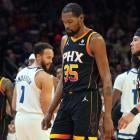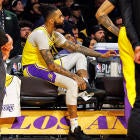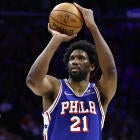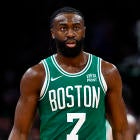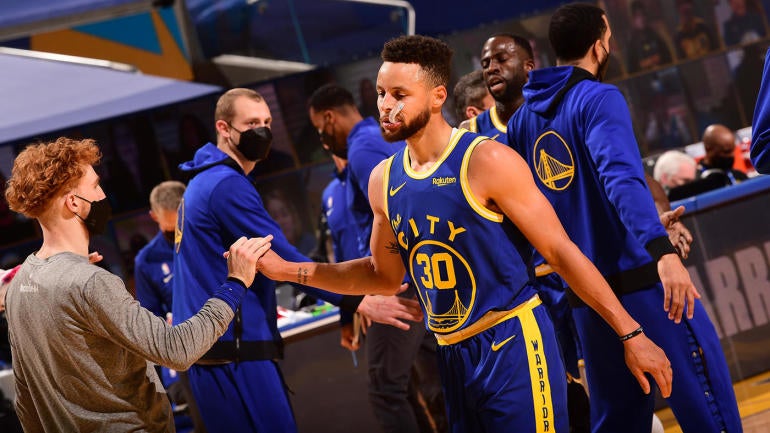
The Golden State Warriors are attempting to do the impossible: extend their current championship window while preparing for their next one. On the rare occasion when it happens, it is usually fortuitous. Kawhi Leonard falling to No. 15 in 2011 is as much luck as it is preparation. Usually, winning any championship, immediate or distant, requires commitment. Trade your assets for immediate star power like Brooklyn did or hoard those picks until they create the sort of contender by default that currently resides in Philadelphia. There typically isn't a middle ground.
The Warriors are trying to find one. They want to compete when Klay Thompson returns next season without sacrificing the medium-to-long-term window they assume James Wiseman and the first-round pick they received from Minnesota will open. Despite Bob Myers' assertion that they'll be "aggressive," this should portend a quiet deadline for Golden State. Without top-tier stars on the market to test Golden State's resolve, the Warriors will likely hold onto their youngsters, and without Thompson back in the fold quite yet, there's little reason to seek out pure rentals for immediate improvement. Coming out of the All-Star break, the coaching staff has already meaningfully tweaked the rotation, opting for upside over steadiness on the second unit by replacing Brad Wanamaker and Damion Lee with Nico Mannion and Jordan Poole.
Any moves the Warriors make in the coming weeks will be geared toward the balance they are trying to strike. They are looking for players that can help both now and later. Here's everything you need to know as they seek out those rarities.
Needs
Bench offense: Golden State's offense is 15 points per 100 possessions worse when Stephen Curry goes to the bench this season, but that's hardly a new problem. Even during the Kevin Durant era, Golden State's offense declined by 15.8 points per 100 possessions on average. This is common among teams with transcendent offensive players, but correctable with the right lead ball-handler.
Shooting: Yes, I'm aware that Curry exists, and yes, I'm aware that Thompson will one day return. That Golden State can still be only an average shooting team despite Curry's production and gravity is concerning. Remove Curry and Lee from the equation and the remainder of the Warriors roster has made only 34.5 percent of its 3-pointers. This was particularly problematic for the Warriors in the 2019 Finals, when their non-Splash Brothers shot 31.2 percent and effectively made driving to the basket impossible. The Warriors have always relied on Curry and Thompson (and, when he was there, Durant) to provide so much shooting that they could skimp on it everywhere else on the roster. That is no longer feasible in the modern NBA, unless you're content dealing with box-and-1 defenses on a regular basis.
Rebounding: The Warriors managed to rebound fairly well during their championship seasons despite playing some of the NBA's smallest lineups. Whatever advantage that made that possible is now gone. They rank 27th in rebounding rate this season and ranked 28th last season. Ideally, a developed Wiseman will help on that front, but Golden State is still probably going to close playoff games with Green at center. Like shooting, aggregate rebounding matters, and right now, almost nobody on the roster does it well.
Assets
- Untouchables: Stephen Curry, Draymond Green, Klay Thompson.
- Probably staying: James Wiseman, Eric Paschall.
- For the right price: Andrew Wiggins, Kelly Oubre, Damion Lee, Nico Mannion, Brad Wanamaker, Mychal Mulder, Kevon Looney, Kent Bazemore.
- Let's make a deal: Alen Smailagic, Jordan Poole.
- Tradable first-round picks: 2021 (Minnesota, protected 1-3, unprotected 2022) or 2022 (own), 2026 or 2027 (own).
- Tradable first-round swap rights: 2022-2023 (own), 2025-2027 (own)
- Tradable second-round picks: 2022 (own), 2022 (Toronto), 2027 (own)
Cap notes
- The Warriors are above the luxury tax line, meaning they can bring in no more than 125 percent of their outgoing salary plus $100,000 in any trade, regardless of the size of the incoming contracts. Fun fact: Golden State has the NBA's most expensive roster.
- The Warriors have a chunk of their taxpayer mid-level exception available. The complete taxpayer mid-level exception is worth $5.7 million, but the Warriors gave Wanamaker $2.3 million of it in the offseason. The remaining $3.4 million has already begun to prorate, and will continue to do so. This exception can only be used on free agents.
- The Warriors have a $9.3 million disabled player exception as a result of Thompson's injury. This exception can be used on free agents or in trades. However, it can only sign players to one-year contracts, and it can only trade for players on expiring deals.
Expiring contracts
- Oubre is an unrestricted free agent with full Bird Rights. The Warriors can pay him anything up to the max in order to retain him.
- Chris is an unrestricted free agent with Early Bird Rights. The Warriors can pay him up to the average player salary (whatever amount the nontaxpayer mid-level exception turns out to be) in order to retain him).
- Wanamaker and Bazemore are unrestricted free agents with Non-Bird Rights. The Warriors can pay them only 120 percent of their 2020-21 salaries in order to retain them unless they dip into their cap exceptions.
- Nico Mannion and Juan Toscano-Anderson are both restricted free agents with Non-Bird Rights. This again limits the Warriors to only 120 percent of their present salary without dipping into cap exceptions, but they will have the right to match outside offers up to that point. Technically, both are subject to the Gilbert Arenas provision, but as they have Non-Bird Rights rather than Early Bird Rights and the Warriors will likely be too expensive to use the nontaxpayer mid-level exception, there are scenarios in which an opposing team could make either an offer that Golden State could not legally match. That is unlikely, though.
Possible trade targets
- Low-end: Danuel House. Houston's veterans are getting the bulk of the coverage (and we'll get to one of them in a moment), but after his inauspicious exit from the bubble, House appears to be a prime candidate for a fresh start. His 3-point percentage has plummeted from over 41 percent two seasons ago down to 31.2 percent this season, and if that sustains, the Rockets won't be able to get anything of value for him down the line. Cashing out now for a second-rounder or two would be the best thing for both parties, and the Warriors would eagerly scoop up a shooter with House's potential.
- Medium-end: Victor Oladipo. The Warriors want another star but they don't want to pay star prices to get one. This is how they walk that line: take on a distressed asset and hope they can rehabilitate it. Oladipo looked like something resembling his old self early in the season with the Pacers. His shooting has fallen off of a cliff in Houston. Would a better team fix that? Could Klay Thompson guard small forwards next season? Could the Warriors even afford to pay Curry, Thompson, Green, Wiggins and Oladipo? Does his game mesh with Steve Kerr's offensive philsoophy? These are all valid questions, and there is no shortage of excuses not to trade for Oladipo. His star-caliber upside and reasonable price tag are the reasons to do so. Players with his talent aren't often available for, say, expiring salary and a decent first-round pick.
- High-end: Lonzo Ball. Yes, at this moment, Ball is more valuable than Oladipo. Golden State reportedly spoke to New Orleans about a Ball-for-Oubre swap earlier this season. Since then, Ball has shot at Curry levels. Over his past 25 games, he's made over 43 percent of the roughly eight attempts per game he's taken. He's never been able to sustain that caliber of shooting, though, and, after he and the Pelicans failed to agree on an extension last offseason, he's headed for restricted free agency. If Ball is still at all available, the Warriors should explore every reasonable avenue to acquire him, especially after botching their chance to select his brother in November. Even if he never duplicates this scorching shooting stretch, his passing genius and defensive versatility make him an excellent long-term fit.
Possible buyout targets
- Guard: Quinn Cook. Cook checks several boxes for the Warriors. He knows their intricate offense from the time he spent with Golden State during the dynasty years. He's one of the NBA's most beloved teammates. He can help solve some of their bench shooting woes. Cook recently signed a 10-day deal with the Cleveland Cavaliers, but if he makes it back onto the market, a reunion makes some sense.
- Forward: Nemanja Bjelica. It's likelier that Bjelica gets traded than bought out, but the Kings are hardly using him, and if getting off of his salary proves too difficult, San Francisco is a pretty short drive from Sacramento. Bjelica shot above 40 percent on 3-pointers three seasons in a row before his sharp decline to 33.3 percent this season. He'd benefit from Curry's shot -creation with the Warriors.
- Center: LaMarcus Aldridge. The Warriors reportedly pursued Blake Griffin with the idea that he could serve as an offensive hub for the second unit Aldridge could as well, sort of. While Griffin's passing would have been valuable in a system with as much movement as Golden State's, there's something to be said for Aldridge's death, taxes and midrange jumpers brand of scoring. He's not particularly efficient at this stage of his career, but he's reliable, and when it comes to backups on the buyout market, it's hard to do much better.















